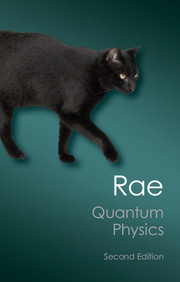Book contents
- Frontmatter
- Dedication
- Contents
- Preface to the first edition
- Preface to the second edition
- 1 Quantum physics
- 2 Which way are the photons pointing?
- 3 What can be hidden in a pair of photons?
- 4 Wonderful Copenhagen?
- 5 Is it all in the mind?
- 6 Many worlds
- 7 Is it a matter of size?
- 8 Backwards and forwards
- 9 Only one way forward?
- 10 Can we be consistent?
- 11 Illusion or reality?
- Further reading
- Index
- Frontmatter
- Dedication
- Contents
- Preface to the first edition
- Preface to the second edition
- 1 Quantum physics
- 2 Which way are the photons pointing?
- 3 What can be hidden in a pair of photons?
- 4 Wonderful Copenhagen?
- 5 Is it all in the mind?
- 6 Many worlds
- 7 Is it a matter of size?
- 8 Backwards and forwards
- 9 Only one way forward?
- 10 Can we be consistent?
- 11 Illusion or reality?
- Further reading
- Index
Summary
‘God’, said Albert Einstein, ‘does not play dice’. This famous remark by the author of the theory of relativity was not intended as an analysis of the recreational habits of a supreme being but expressed his reaction to the new scientific ideas, developed in the first quarter of the twentieth century, which are now known as quantum physics. Before we can fully appreciate why one of the greatest scientists of modern times should have been led to make such a comment, we must first try to understand the context of scientific and philosophical thought that had become established by the end of the nineteenth century and what it was about the ‘new physics’ that presented such a radical challenge to this consensus.
What is often thought of as the modern scientific age began in the sixteenth century, when Nicholas Copernicus proposed that the motion of the stars and planets should be described on the assumption that it is the sun, rather than the earth, which is the centre of the solar system. The opposition, not to say persecution, that this idea encountered from much of the establishment of that time is well known, but this was unable to prevent a revolution in thinking whose influence has continued to the present day. From that time on, the accepted test of scientific truth has increasingly been observation and experiment rather than religious or philosophical dogma.
- Type
- Chapter
- Information
- Quantum PhysicsIllusion or Reality?, pp. 1 - 16Publisher: Cambridge University PressPrint publication year: 2012



